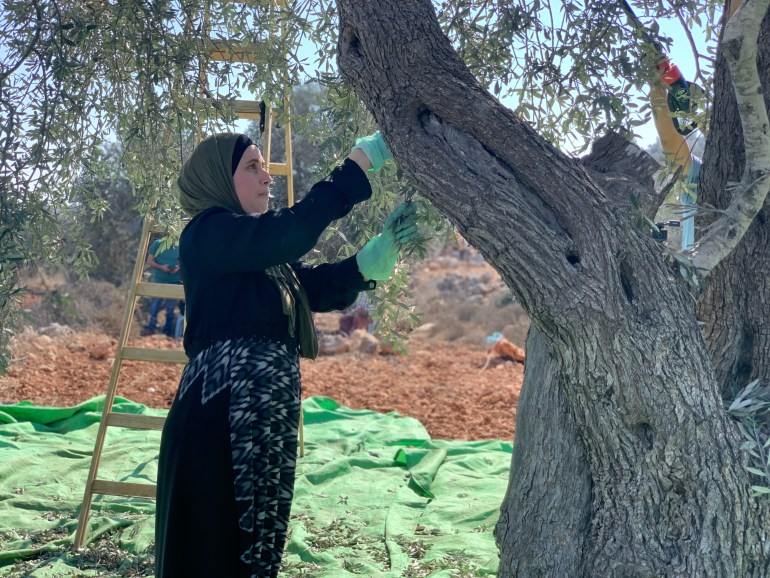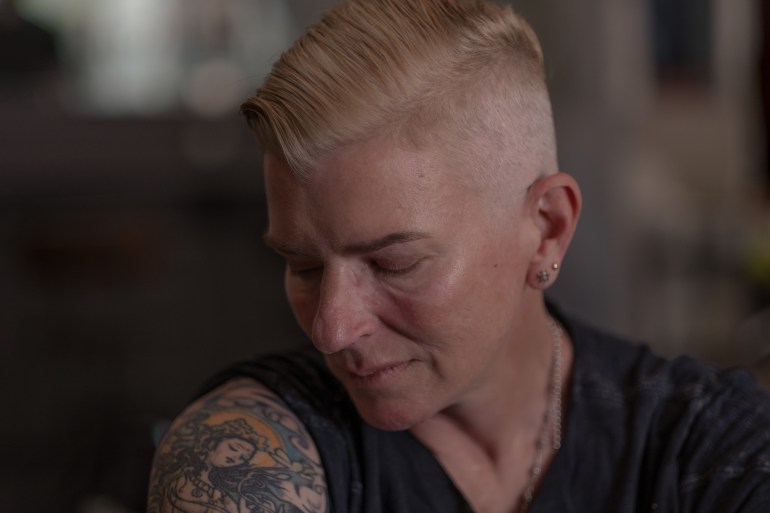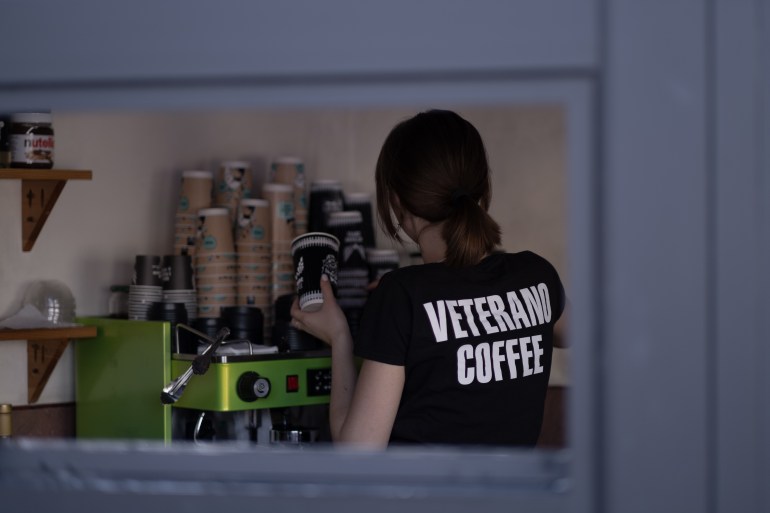Ukrainian soldiers bear the invisible scars of war
How widespread traumatic brain injuries, once the hidden wounds of the seven-year conflict, are now coming to light.

Commander Hrishak at the front line in the Donetsk region, eastern Ukraine. In a protracted conflict, soldiers and veterans are starting to learn about the hidden effects of drawn-out exposure to blasts
[Nils Adler/Al Jazeera]
LONG READ
Al Jazeera
10 Oct 2021
Kyiv, Ukraine – Volodymyr*, a 49-year-old contract soldier, is sitting between two raucous tables of young people in a trendy Kyiv pub. It is his day off; the late afternoon sun streams through the windows and across his hulking frame as he orders a juice from the menu. He is a man of few words, but when he does speak, he does so with intensity, staring directly at you with his close-set light blue eyes.
Volodymyr is teetotal, just one example of the self-control he developed during a life of hardship, including a brutal Soviet military service in his youth that saw him routinely physically and verbally assaulted for being Ukrainian. Later, as a professional boxer, he honed the art of physical and mental discipline.
In 2014, when Russian-backed separatists invaded his hometown of Donetsk, in eastern Ukraine, he felt as if his soul was tearing apart. But rather than join the rioters on the streets, seeing that the city would fall, he decided to leave and return as a soldier.

A building in Sloviansk, eastern Ukraine, that was destroyed during fighting in 2014
[Nils Adler/Al Jazeera]
Then, a few years ago, he was on the front line when a 152mm artillery shell landed near to him, sending a shockwave through his skull, tearing through fluids and matter at the speed of sound. For more than six months after the blast, Volodymyr felt overwhelming dizziness. “Sitting down, getting up, any movement would make me feel nauseous,” he says. “It was really, really scary. I felt like it would never end.”
Volodymyr had suffered what is known as a traumatic brain injury (TBI), which can cause dizziness, partial deafness and, in severe cases, disability or death but can also develop into mental health conditions including depression and anxiety disorders.
Volodymyr is no longer his calm former self. His injury and years at war have made him prone to uncharacteristic outbursts, especially when he leaves the front line. “When I come back to civilian life I feel like a wild man. I don’t notice, but I am yelling at everyone for which I get a lot of reprimands,” he says.
Volodymyr had no physical injuries, so he decided to keep his symptoms to himself, in line with what he says is the army’s culture of silence. “My problems are mine alone, I don’t want to burden someone else.”
The Ukrainian military was woefully unprepared and underfunded when the war against Russian-backed separatists erupted in April 2014. As a result, hastily formed volunteer regiments led by inexperienced commanders joined the fight in eastern Ukraine. On the front line, soldiers and volunteers were exposed to weeks or even months of battlefield explosions, leading to TBIs and other invisible wounds.
Seven years later, in a protracted conflict that to date has killed more than 14,000 people, the true effect of these injuries is only now coming to light.
Fighting continues today in the Donetsk region in eastern Ukraine
[Nils Adler/Al Jazeera]
Constant blasts and gunfire
At a small park in Popasna, a city located in the Luhansk region, veterans apply the finishing touches to a skate park they have built for local youth as part of a community outreach programme.
In 2014, the city was a flashpoint between Russian-backed separatists and a unit of Ukrainian volunteer fighters. Now, the front line is more than two kilometres away, but the sound of sporadic gunfire and shelling is still audible throughout the night.
Valery Chobotar, a tall, wiry 45-year-old former volunteer commander turned therapist, is working to raise awareness about the physical and mental health effect of the conflict on Ukrainian veterans.
“The biggest problem [among veterans] is brain injuries caused by non-stop shooting and explosions,” he says, speaking at the skate park. “And before there were no competent specialists who could explain the consequences.”

Valery Chobotar, a veteran and therapist, works with veterans to manage the effects of traumatic brain injuries
[Nils Adler/Al Jazeera]
He learned about the prevalence of these injuries in recent years as he sought to address mental health issues faced by veterans and found that patients described having initially sustained symptoms such as confusion and dizziness associated with trauma to the head.
Chobotar, a martial arts coach before the war, participated in the long and violent battle for Donetsk airport, an experience he describes as comparable to getting hit in boxing for days on end. The constant gunfire and shelling damaged his hearing and led to chronic insomnia and nervous breakdowns. “A person should not spend more than a week under heavy fire, but no one knew that and so there was no rotation,” he says. “We remained under fire for a few months.”
With only “invisible wounds” such as severe nausea, dizziness or vomiting, soldiers could often return to the front line only a few days after being subjected to a heavy blast. In addition, doctors unaware of TBI could even misdiagnose it as sclerosis or a hypertensive crisis, according to Dr Kseniia Voznitsyna, a neurologist researching the effects of TBIs on Ukrainian veterans.
This lack of diagnosis and treatment left soldiers to suffer in silence for years with many developing post-concussion syndrome, which is what Voznytsina is focusing on. This is a common follow-up to TBI with somatic, cognitive and emotional symptoms including brain fog, memory loss, blurry vision, headaches, anxiety and depression.
Breaking the stigma
As part of his training to become an Olympic sports coach before the conflict, Chobotar studied a psychology course that helped him identify certain changes to his mental health when he returned to civil life in 2015 after his wife became pregnant. To better understand these changes, he enrolled in an educational programme to learn Bodynamic, a form of body-orientated psychotherapy developed in Denmark to treat veteran shock and trauma.
The training helped him understand the effects of the conflict. “You understand that it’s not you who’s an idiot. You have just had a physiological and psychological reaction, deep inside, that surfaces in certain situations, but that can be worked with,” he says.
Chobotar decided to start a community called “equal to equal” where veterans could meet, share their traumatic wartime experiences, and discuss how they were dealing with them. During these meetups, he found that their shared background helped build trust and break the stigma that prevented many soldiers like Volodymyr from speaking out.

A bus stop called ‘veteran’ sits just outside the militarised zone in the Donetsk region [Nils Adler/Al Jazeera]
Chobotar now holds regular sessions with veterans. To help them open up, he says he starts by talking about his own experiences, rather than asking the veterans about what happened to them. “Some of them think they are the only ones to experience these things, and so that barrier is immediately gone, and they feel comfortable around me.”
He also believes that when veterans hear experiences that resonate with their own, it allows them to be kinder to themselves. “You start to realise that these are just normal reactions to abnormal circumstances.”
Centre for mental health, effects of TBI
In recent years, many privately funded Ukrainian initiatives have emerged to raise awareness about veterans’ mental health struggles and provide psychological support.
Situated in a leafy Kyiv suburb is the Lisova Poliana War Veterans Hospital, the first medical treatment centre for mental health conditions and the effects of TBI among veterans in Ukraine. Opened in late 2019 by Voznytsina and a team of psychologists, doctors and lawyers, the building is a sprawling grey complex with large open spaces, leisure facilities, and an abundance of plants. In these tranquil surroundings, veterans attend a range of individual and group therapy sessions as well as receive legal support to help with securing government benefits.
Dr Kseniia Voznitsyna is a neurologist and founder of the first mental health rehabilitation centre for veterans in Ukraine
[Nils Adler/Al Jazeera]
Voznitsyna runs a tight ship at the centre with a strict no-smoking policy and a busy schedule. She has worked with soldiers returning from the front line since 2014 and foresaw the issues caused by overexposure to gunfire and heavy artillery. “In 2014-2016, we had lots of traumatic brain injuries, but there were no programmes that told us how to work with this and what to do with these people,” she says.
At the time, post-traumatic stress disorder (PTSD) was the primary health concern. This condition had blighted an early generation of Ukrainian veterans who had fought in the Soviet-Afghan war (1979-1989), many of whom found it difficult to find employment on their return and fell into a life of crime.
Chobotar believes the media has created a national fear around soldiers returning with PTSD, something that has affected today’s veterans. “They are terrified of being the ones with this condition, that’s often why they don’t ask for help,” he says.
Widespread TBIs
Voznitsyna has seen many cases of PTSD among veterans, and while the symptoms can overlap, she sees a higher prevalence of post-concussion syndrome as a consequence of TBI.
Research conducted by the Lisova Poliana hospital started to officially record incidents of traumatic brain injuries in 2019 and found that in 2020, among 1,470 veterans at the centre, more than 56 percent suffered a TBI.
Since 2014, the Ukrainian army has grown from 140,000 to 255,000 active-duty personnel in 2021. The presence of volunteer battalions during the early years when the fighting was the heaviest make it very difficult to know exactly how many soldiers were exposed to blast explosions. However, recent data from the Special Monitoring Mission for the Organization for Security and Cooperation in Europe shows the potential scale of the issue, with more than 80,000 explosions recorded in the Luhansk and Donetsk regions during 2018 when monitoring began.
According to Voznitsyna, doctors dismissed many of the early cases. “Soldiers would say, ‘I am OK. I puked, I lay at home for three days and then I went back [to the front line]’.”
Some soldiers could feel fine for one or two years after their initial symptoms, Voznitsyna explains, but left untreated, they risk facing a serious setback which can be terrifying if they are not aware of what is happening. Voznitsyna is now working with her team to educate doctors on how to detect TBI symptoms.

At the Lisova Poliana hospital, canine therapy allows veterans to form a connection with a creature that gives them unconditional love and does not judge them and helps prepare them to open up to psychologists
[Nils Adler/Al Jazeera]
Still, persuading battle-hardened veterans and current soldiers to open up remains a challenge for Voznitsyna and her team, so they enlisted the help of Hero’s Companion, a Canadian-Ukrainian non-for-profit project that offers canine therapy.
The veterans are invited to connect with the dogs through play. “It doesn’t matter if you only have one leg, one eye, you are grumpy or you are stupid, the dog just loves you,” says Elen Musichuk, a psychologist at the medical centre. It is a vital first step in preparing the clients to meet with a psychologist. Once they realise that “a small furry creature” can provide unconditional love, “they no longer see the world as black and white, and that’s when we can start our work,” she says.
Iron and steelworks dominate the local economy of Mariupol, which is also a rich cultural hub
[Nils Adler/Al Jazeera]
Stuck between two worlds
Mariupol, a vital economic and industrial hub located by the Sea of Azov in southeastern Ukraine, is a city of contrasts. Surrounded by a major seaport and two gargantuan metallurgical plants, the city is also a rich cultural centre, while popular resorts line its scenic seafront.
At a popular café in the city centre, Yulia Pajevska, a paramedic with seven years of front line experience, reflects on how the transition between military and civilian life can be difficult for soldiers and veterans. Rules, designed to keep you alive, govern life on the front line, but there is less of a plan in civilian life, and this spontaneity can be disorientating, she says.
Yulia Pajevska is a paramedic responsible for hundreds of medical evacuations from the frontline. She is also a successful para-athlete but wonders if she can ever return to civilian life
[Nils Adler/Al Jazeera]
Pajevska gives the example of a veteran who wants to buy a beer: they open a map, look for the nearest bar or shop and head directly there, whereas their civilian friends might prefer to take a walk and stumble upon somewhere.
This can cause distress for a person used to the strict regime of military life. “Their goal is to drink beer and not to wander around and get into trouble,” she says. “But civilians do not care about being organised.”
Many soldiers returning from the front line have a personal decompression strategy to help cope with the confusion of normal life. Roman Hrishak, a commander currently serving in the trenches around the village of Pisky in the Donetsk region, says that when he comes home, he does not speak to anyone but his wife and children for the first three days. Hrishak’s wife is a veteran who can relate to his experience. For others, it is more difficult, he says. “They tell their families fairytales about their life on the front line, that it is a wonderful time filled with gardening.”
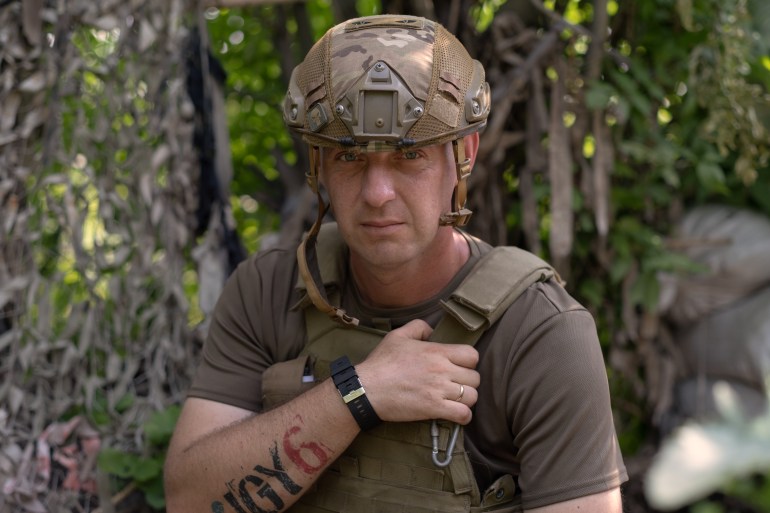
Commander Hrishak stands in the trenches, only 600 metres from positions controlled by Russian-backed separatists. When he is not on duty, he speaks only to his family for three days as part of his personal decompression strategy
[Nils Adler/Al Jazeera]
Some soldiers, like Hrishak, may only need a few days to adapt, but for those who have had a TBI or with conditions such as PTSD, this disorientation can result in further trauma and isolation from society.
Chobotar recalls the shock he experienced when he returned to civilian life. “My brain would always look for danger such as hidden snipers, if I saw smoke, I would immediately try to analyse what weapon was used.”
Pajevska, who still works as a medic on the front line, questions whether it will ever be possible to return to ordinary life. “I feel like I am between two worlds, watching from the side.”
This kiosk is part of a larger franchise called the Veterano Group, founded by Leonid Ostaltsev and owned entirely by veterans. The group’s vision is to change society’s perception that veterans are unable to integrate back into society and find it difficult to hold down a job
[Nils Adler/Al Jazeera]
Bridge to civilian life
In recent years, some have sought to challenge the stigma attached to veterans by highlighting the attributes of people with combat experience.
One of these is Leonid Ostaltsev, a fast-talking, no-nonsense entrepreneur who founded Pizza Veterano, a pizzeria and the first public enterprise in Ukraine created by war veterans. “I always encourage veterans to open a business because it is the perfect opportunity to use your war experience,” he says. “It’s similar rules – planning, teamwork, risk analysis, leadership.”
Chobotar believes there is a strength to many veterans which the Ukrainian media chooses to ignore. “It is often said that veterans or soldiers get divorced, do not keep in touch with their family and become aggressive, but I can’t help but notice that many veterans, including me, grow fonder of their families. You love your country even more.”
Most experts, like Voznitsyna, agree that the first step to help soldiers like Volodymyr heal and re-enter civilian life is for there to be a support network.

Veteran Hub in Kyiv is a space where veterans can seek free psychological and legal support
[Nils Adler/Al Jazeera]
The Veteran Hub is one such network with coworking spaces and hangout spots in Kyiv, Dnipro and Vinnytsia where veterans and their relatives can seek free legal and psychological support.
Artem Denysov, CEO of the Veteran Hub, recalls an incident where a veteran with a prosthetic leg came to the Kyiv branch and spent the day drinking coffee. On his way out he passed reception and said, “Thank you for not caring.” Concerned, Denysov asked what they had done wrong. “No, I am thankful,” he recalls was the man’s response. “You ignored my prosthetic leg and received me as a normal person.”
Denysov wants the Hub to provide a bridge between veterans’ military and civilian identities. “When you are serving, you know who you are,” he says. “You are in the second platoon, the third brigade, for example, but no one explains what your identity is as a veteran. You have to find it and build it.”
Today, the Ukrainian military is better trained and equipped, and the fighting is much lower intensity than during the early years of the war. But regular skirmishes still occur along the front line as do daily bomb blasts, and the conflict still takes a physical and mental toll on the soldiers serving.
The creation of the Ministry for Veterans Affairs in 2018 demonstrated that the government was finally aiming to address the issues facing this generation of soldiers. It recently developed services for treating the long-term effects of mine blast trauma as well as for medical and psychological rehabilitation. But many believe healing will be a long process.
Volodymyr believes he is ready to seek psychological help but says that it is not possible to speak about his problems with his fellow soldiers. He points to his chest and explains why: “We keep it all inside.”
*Volodymyr’s surname has not been used to protect his identity.
SOURCE: AL JAZEERA
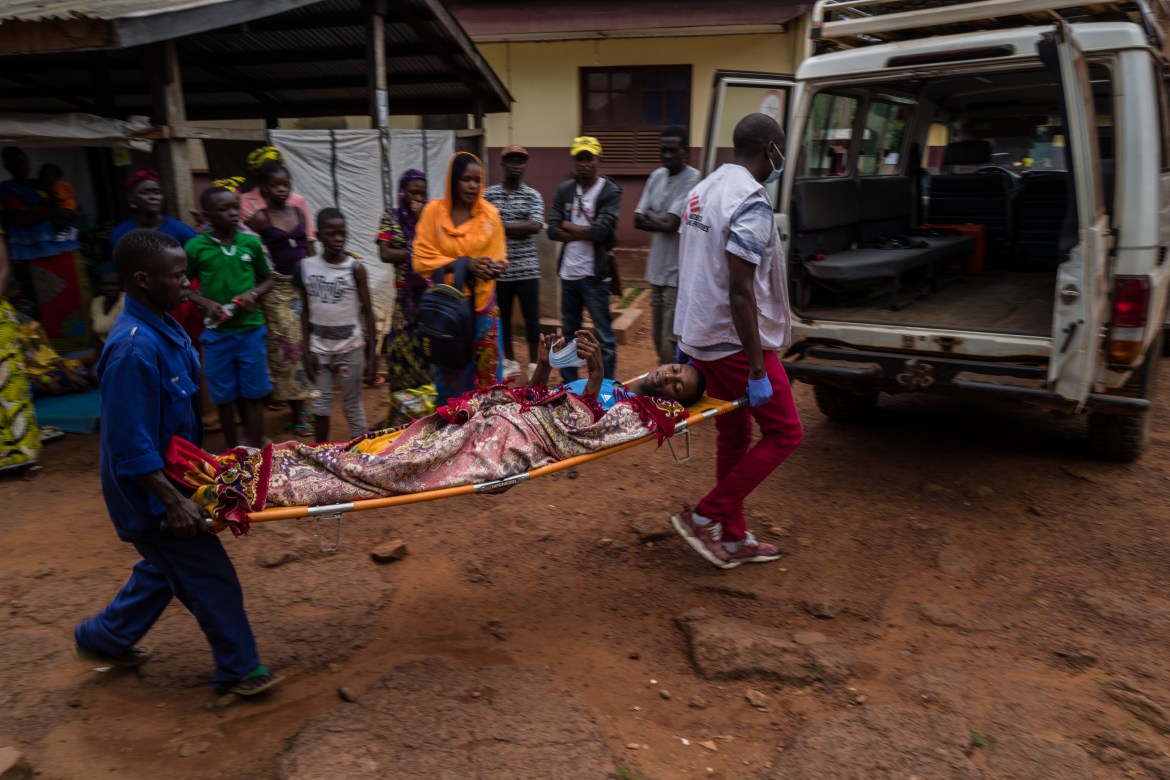
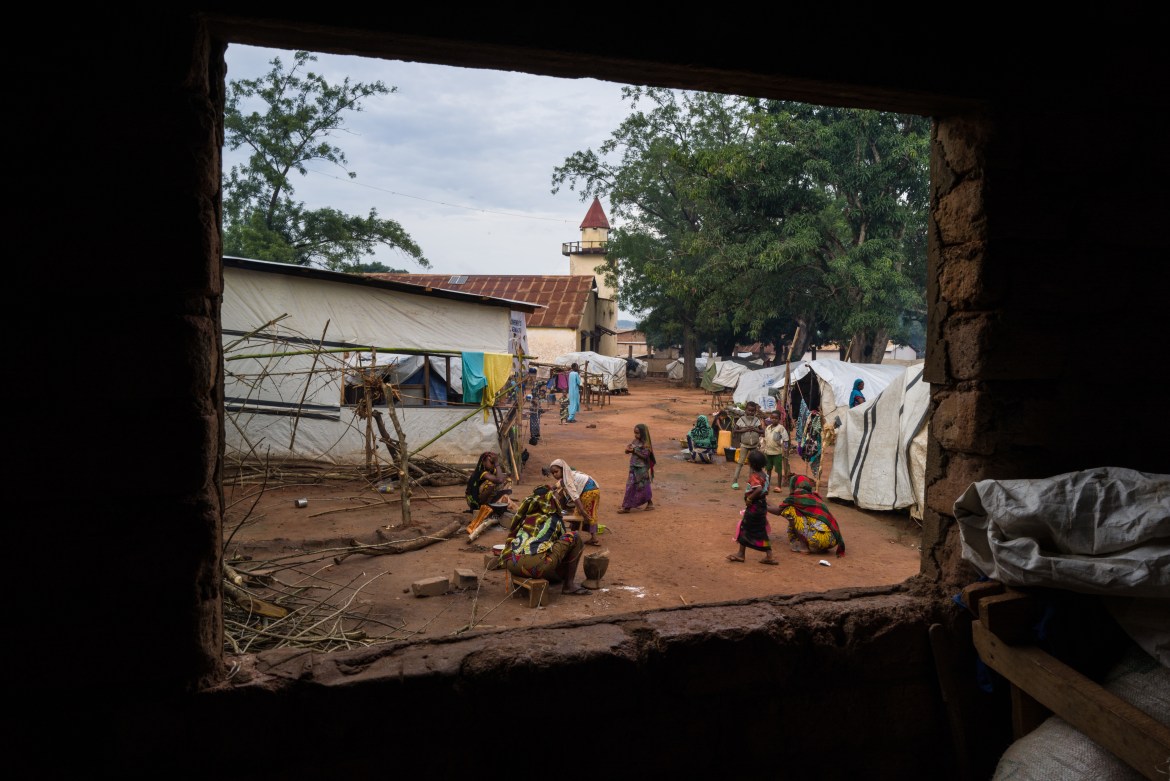
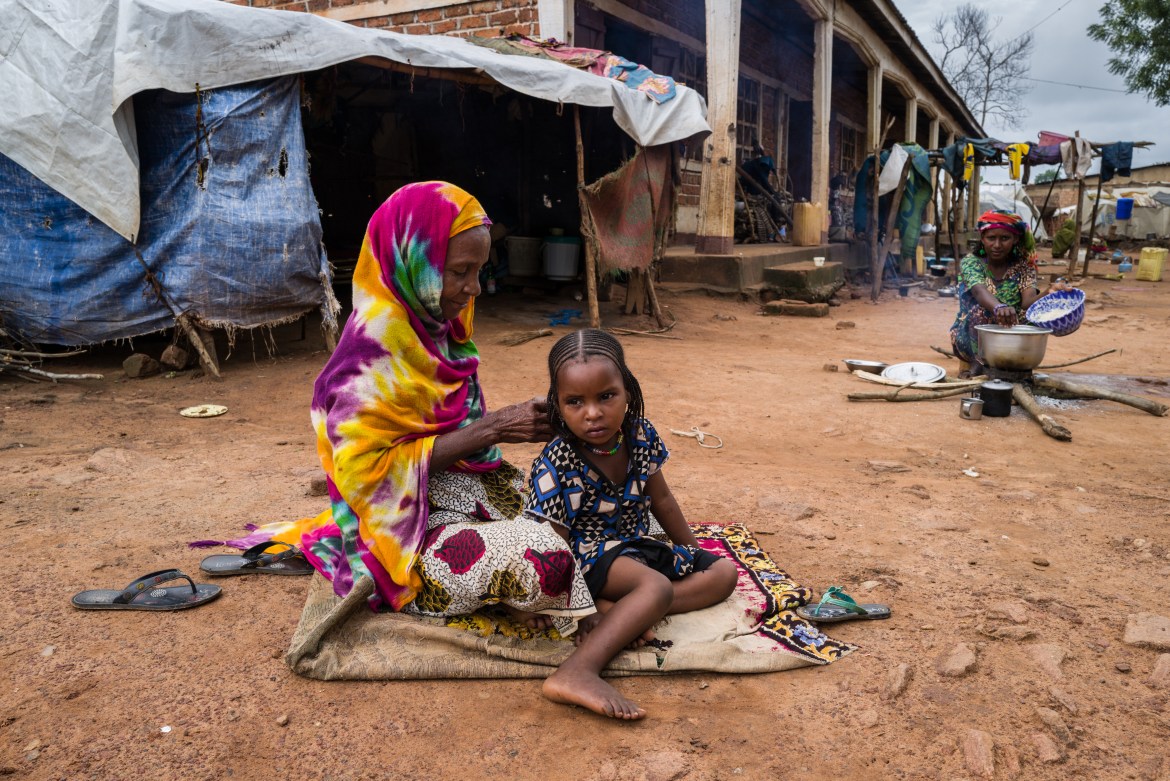
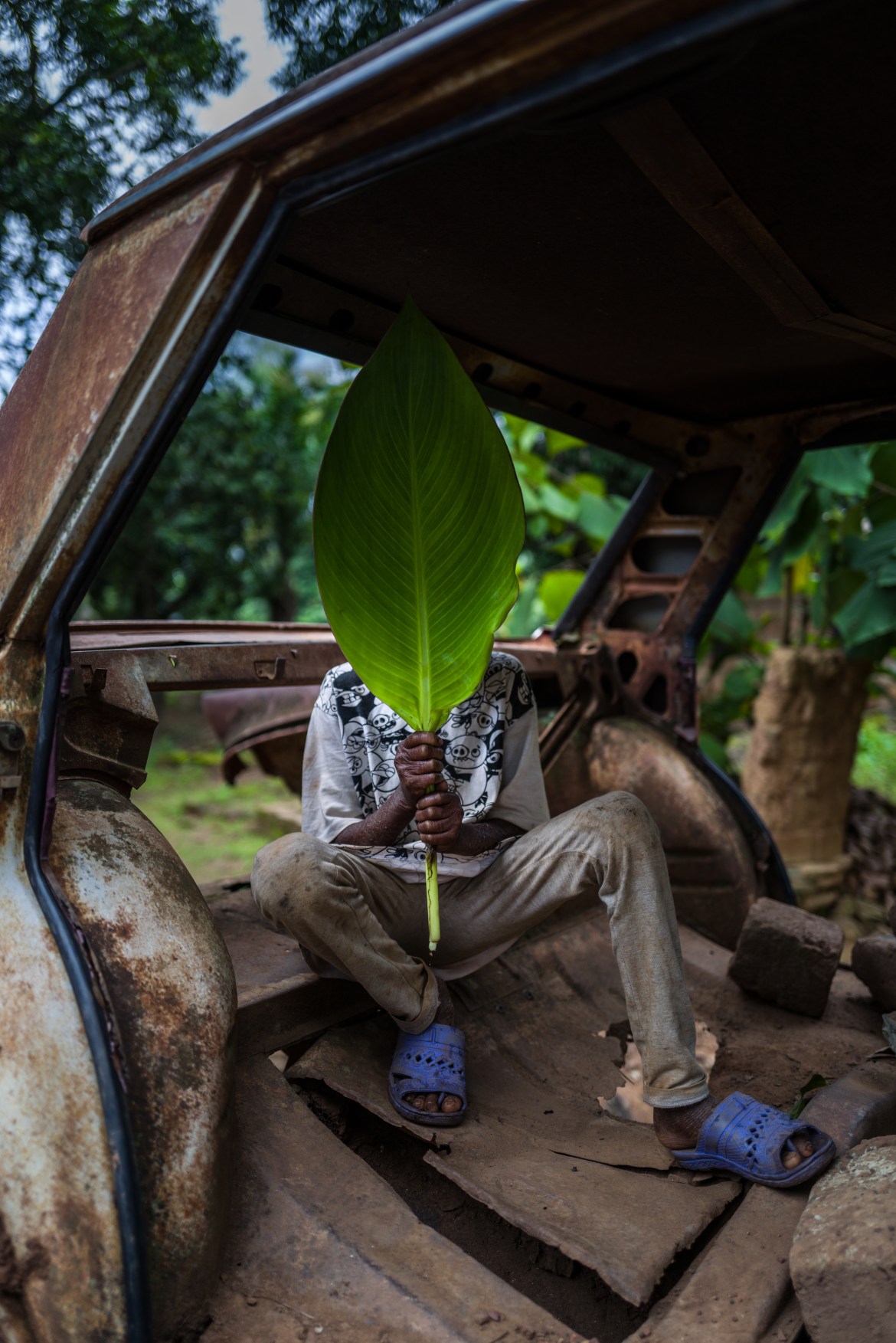




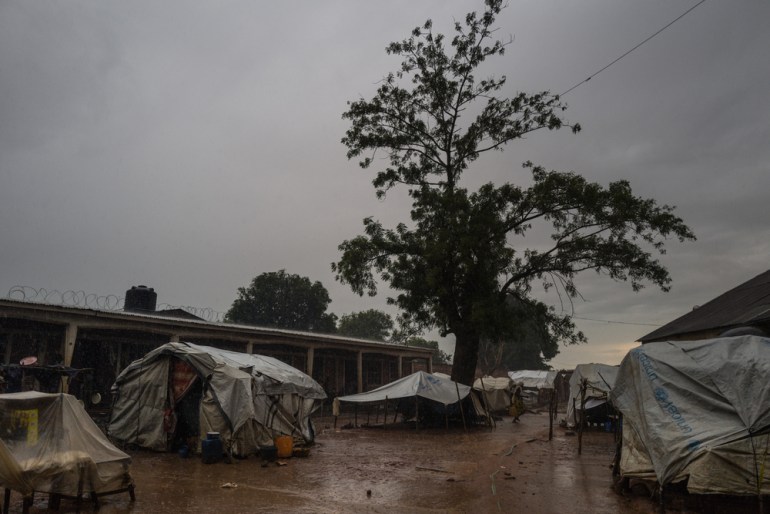 During the rainy season the displaced people living in the compound of the central mosque in Bambari cannot sleep, as they only have mats in the floor. The women cannot even cook because the firewood gets wet. [Lys Arango/MSF]
During the rainy season the displaced people living in the compound of the central mosque in Bambari cannot sleep, as they only have mats in the floor. The women cannot even cook because the firewood gets wet. [Lys Arango/MSF]




